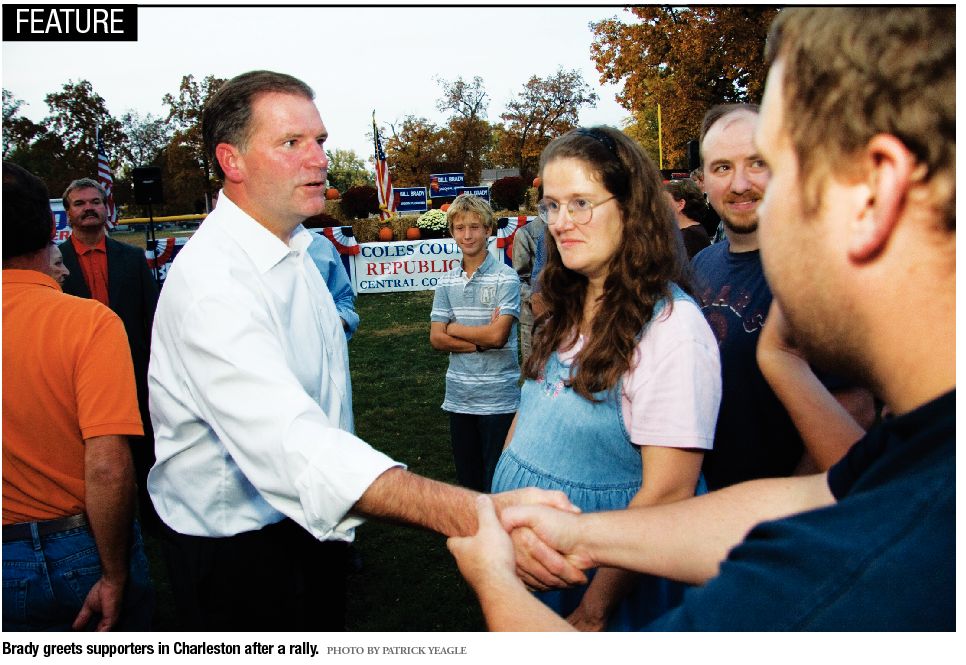
The cost of Bill Brady’s plan
Redfield says education and health care will likely take the brunt of the cuts, because they make up most of the state’s budget. Brady’s cuts would likely result in some combination of furloughs, fewer teachers and higher property taxes.
Redfield says the cuts would also affect the City of Springfield’s income because the state gives one-tenth of income tax revenue back to municipal governments.
“Balancing the state budget and getting to that magic figure in terms of cuts involves eliminating revenue sharing between state and local governments,” he says. “You’re going to get higher property taxes locally or a reduction in services. You take that money away from the city and county, and you’re looking at impacts on police, fire….Then on the education side, if you’re reducing state aid, you either make that up through higher property taxes or reducing the number of teachers.”
Brady has repeatedly declined to say whether his proposed 10 percent cut would be across the board or targeted to certain agencies or programs. If the cut is across the board, it would reduce the current state education budget by $928 million, from $9.28 billion to $8.36 billion. The Department of Healthcare and Family Services, which oversees Medicaid and child support, would see its budget reduced from $7.97 billion to $7.17 billion, a $797 million cut. The 2011 budget from the state’s General Revenue Fund would be cut from about $26 billion to $23.4 billion, a $2.6 billion cut. With the state facing an estimated $13 billion budget deficit, Brady would have to cut billions more to balance the budget without a tax increase. The state would also likely lose money from federal matching funds.
The Republican hopeful proposes to save more money by switching pensions for future state hires to a “defined contribution” plan, in which the state’s contribution is limited to a specific rate. In the current “defined benefit” system, an employee’s benefit level is guaranteed and the state’s contribution depends on a formula specific to each employee. The Chicago-based Center for Tax and Budget Accountability says switching pension systems would actually cost the state more in administrative costs, however. Current state employee benefits are guaranteed in Article 13, Section 5 of the state constitution, so the state would essentially have two different retirement systems to manage – a defined benefit system for current retirees, and a defined contribution system for future retirees. The state would not see any savings on current retirees.
Redfield says changing the system “doesn’t do anything for liability or the actual bottom line,” referring to the state’s unfunded pension liability of $73 billion and the pension payments that liability requires.
“You’re also going to have to start paying Social Security for those new hires,” he adds.
In addition to cutting state spending, Brady says he would create a better business climate in Illinois by eliminating many taxes and fees on businesses and passing limits on lawsuit damages. He also proposes a series of tax credits to entice businesses to relocate to Illinois or continue to operate here, including credits to reward businesses that create new jobs, offset the cost of energy for manufacturers and reduce taxes for research and development firms.
“You can’t be for jobs and against business any more than you can be for eggs and against chickens,” Brady quips.
To reform campaign finance, Brady advocates $4,800 limits on political contributions from individuals for each election cycle, along with bans on contributions from corporations and unions. There are currently no dollar limits on campaign contributions in Illinois, and corporations and unions can give unlimited amounts of money to candidates. Since July 1, Brady has added about $9 million in campaign funds to his previous total of $2.3 million, according to paperwork filed with the State Board of Elections. Much of Brady’s campaign money came from Illinois companies that would be banned from giving under his reform proposal.
Brady says he hopes to take redistricting power away from the General Assembly and give it to the State Board of Elections, which would use computer software to generate district maps based on population density and other factors.
On a range of social issues, Brady is decidedly conservative. He says he would sign legislation allowing concealed carry of firearms in Illinois, one of two states that do not currently allow it. Shortly after winning the Republican nomination, Brady introduced a constitutional amendment that would ban gay marriage and civil unions, and sponsored a
bill that would allow certain organizations to discriminate based on
sexual orientation. He has advocated lowering the minimum wage and
opposed a constitutional amendment to create a graduated-rate income tax
system in which those with higher income would pay a higher percentage
of their income in taxes. In a questionnaire administered by Project
Vote Smart in 2002, Brady indicated he believes abortion should only be
allowed when a woman’s health is in danger. He has not filled out an
updated questionnaire for 2010, despite requests from that organization.
He has also removed his name from several legislative bills that drew
criticism, including a bill he introduced to legalize mass euthanasia in
animal shelters.